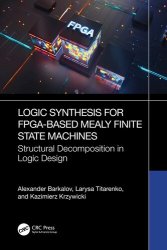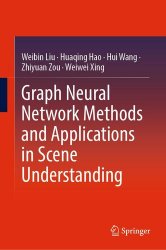Logic Synthesis for FPGA-Based Mealy Finite State Machines: Structural Decomposition in Logic Design
 Название: Logic Synthesis for FPGA-Based Mealy Finite State Machines: Structural Decomposition in Logic Design
Название: Logic Synthesis for FPGA-Based Mealy Finite State Machines: Structural Decomposition in Logic DesignАвтор: Alexander Barkalov, Larysa Titarenko, Kazimierz Krzywicki
Издательство: CRC Press
Год: 2025
Страниц: 332
Язык: английский
Формат: pdf (true), epub
Размер: 21.6 MB
This book is devoted to the logic synthesis of field programmable gate array (FPGA)-based circuits of Mealy finite state machines (FSM). Three new methods of state assignment are proposed, which allows obtaining FSM circuits required minimum amount of internal chip resources.
Logic Synthesis for FPGA-Based Mealy Finite State Machines: Structural Decomposition in Logic Design contains several original synthesis and optimization methods based on the structural decomposition of FPGA-based FSM circuits developed by the authors. To optimize FSM circuits, the authors introduce the use of three methods of state assignment: twofold, extended, and composite. These methods allow for the creation of two- or three-level architectures of FSM circuits. The authors also demonstrate how the proposed methods, FSM architectures and synthesis methods can replace known solutions based on either functional decomposition or classical methods of structural decomposition. The authors also show how these architectures have regular systems of interconnections and demonstrate positive features compared to methods based on functional decomposition, including producing circuits with fewer elements that are faster and consume less power than their counterparts. The book includes experimental results proving the efficiency of the proposed solutions and compares the numbers in Look-up Tables (LUTs), showing the performance (maximum operating frequency) and power consumption for various methods of state assignment.
The very rapid development of computer science is one of the main characteristics of our time. Practically, in any field of human activity, we can find various digital systems. Three major factors characterize the up-to-day state of the art in the computer science. The first factor is the development of ultra-complex VLSI chips which have billions of transistors and hundreds of millions of equivalent gates. The second factor is the development of hardware description languages such as VHDL and Verilog that permits to capture a design with tremendous complexness. The third factor is the wide application of different CAD tools to design very complex VLSI-based projects in a satisfactory time. These three factors significantly affect the process of digital hardware design. Now, this process is very similar to the process targeting computer programs. The mutual application of hardware description languages and CAD tools allows concentrating the designer's energy on the basic problems of design, whereas routine work remains the prerogative of CAD tools. Tremendous achievements in the area of semiconductor electronics turn microelectronics into nanoelectronics. Actually, we observe a real technical boom connected with achievements in nanoelectronics. It results in the development of very complex integrated circuits, particularly in the field of programmable logic devices. Our book targets FSM-based sequential blocks implemented with field-programmable gate arrays (FPGAs). The largest of FPGA chips have over 7 billion of transistors. So, they are so huge, that it is enough only one chip to implement a very complex digital system including a lot of combinational and sequential blocks. Because of the extreme complexity of modern FPGAs, it is very important to develop effective design methods targeting particular properties of these chips.
The audience for this book is students, researchers, and engineers specializing in computer science/ engineering, electronics, and telecommunications. It will be especially useful for engineers working within the scope of algorithms, hardware-based software accelerators and control units, and systems based on the use of FPGAs.
Скачать Logic Synthesis for FPGA-Based Mealy Finite State Machines: Structural Decomposition in Logic Design
[related-news] [/related-news]
Комментарии 0
Комментариев пока нет. Стань первым!















